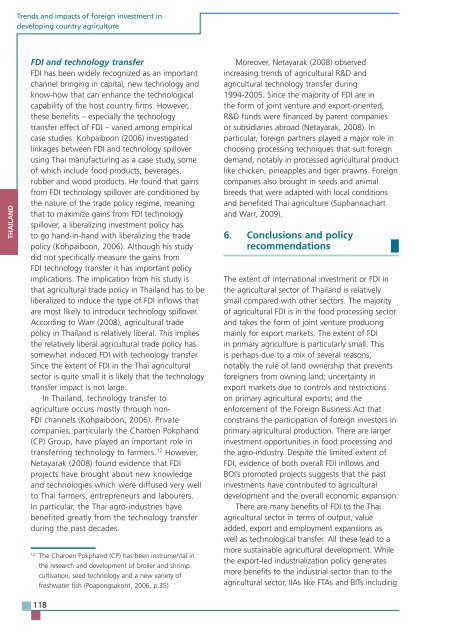TRENDS AND IMPACTS OF FOREIGN INVESTMENT IN DEVELOPING COUNTRY AGRICULTURE
TRENDS AND IMPACTS OF FOREIGN INVESTMENT IN DEVELOPING COUNTRY AGRICULTURE
TRENDS AND IMPACTS OF FOREIGN INVESTMENT IN DEVELOPING COUNTRY AGRICULTURE
Create successful ePaper yourself
Turn your PDF publications into a flip-book with our unique Google optimized e-Paper software.
THAIL<strong>AND</strong><br />
Trends and impacts of foreign investment in<br />
developing country agriculture<br />
FDI and technology transfer<br />
FDI has been widely recognized as an important<br />
channel bringing in capital, new technology and<br />
know-how that can enhance the technological<br />
capability of the host country firms. However,<br />
these benefits – especially the technology<br />
transfer effect of FDI – varied among empirical<br />
case studies. Kohpaiboon (2006) investigated<br />
linkages between FDI and technology spillover<br />
using Thai manufacturing as a case study, some<br />
of which include food products, beverages,<br />
rubber and wood products. He found that gains<br />
from FDI technology spillover are conditioned by<br />
the nature of the trade policy regime, meaning<br />
that to maximize gains from FDI technology<br />
spillover, a liberalizing investment policy has<br />
to go hand-in-hand with liberalizing the trade<br />
policy (Kohpaiboon, 2006). Although his study<br />
did not specifically measure the gains from<br />
FDI technology transfer it has important policy<br />
implications. The implication from his study is<br />
that agricultural trade policy in Thailand has to be<br />
liberalized to induce the type of FDI inflows that<br />
are most likely to introduce technology spillover.<br />
According to Warr (2008), agricultural trade<br />
policy in Thailand is relatively liberal. This implies<br />
the relatively liberal agricultural trade policy has<br />
somewhat induced FDI with technology transfer.<br />
Since the extent of FDI in the Thai agricultural<br />
sector is quite small it is likely that the technology<br />
transfer impact is not large.<br />
In Thailand, technology transfer to<br />
agriculture occurs mostly through non-<br />
FDI channels (Kohpaiboon, 2006). Private<br />
companies, particularly the Charoen Pokphand<br />
(CP) Group, have played an important role in<br />
transferring technology to farmers. 12 However,<br />
Netayarak (2008) found evidence that FDI<br />
projects have brought about new knowledge<br />
and technologies which were diffused very well<br />
to Thai farmers, entrepreneurs and labourers.<br />
In particular, the Thai agro-industries have<br />
benefited greatly from the technology transfer<br />
during the past decades.<br />
12 The Charoen Pokphand (CP) has been instrumental in<br />
the research and development of broiler and shrimp<br />
cultivation, seed technology and a new variety of<br />
freshwater fish (Poapongsakorn, 2006, p.35)<br />
118<br />
Moreover, Netayarak (2008) observed<br />
increasing trends of agricultural R&D and<br />
agricultural technology transfer during<br />
1994-2005. Since the majority of FDI are in<br />
the form of joint venture and export-oriented,<br />
R&D funds were financed by parent companies<br />
or subsidiaries abroad (Netayarak, 2008). In<br />
particular, foreign partners played a major role in<br />
choosing processing techniques that suit foreign<br />
demand, notably in processed agricultural product<br />
like chicken, pineapples and tiger prawns. Foreign<br />
companies also brought in seeds and animal<br />
breeds that were adapted with local conditions<br />
and benefited Thai agriculture (Suphannachart<br />
and Warr, 2009).<br />
6. Conclusions and policy<br />
recommendations <br />
The extent of international investment or FDI in<br />
the agricultural sector of Thailand is relatively<br />
small compared with other sectors. The majority<br />
of agricultural FDI is in the food processing sector<br />
and takes the form of joint venture producing<br />
mainly for export markets. The extent of FDI<br />
in primary agriculture is particularly small. This<br />
is perhaps due to a mix of several reasons,<br />
notably the rule of land ownership that prevents<br />
foreigners from owning land; uncertainty in<br />
export markets due to controls and restrictions<br />
on primary agricultural exports; and the<br />
enforcement of the Foreign Business Act that<br />
constrains the participation of foreign investors in<br />
primary agricultural production. There are larger<br />
investment opportunities in food processing and<br />
the agro-industry. Despite the limited extent of<br />
FDI, evidence of both overall FDI inflows and<br />
BOI’s promoted projects suggests that the past<br />
investments have contributed to agricultural<br />
development and the overall economic expansion.<br />
There are many benefits of FDI to the Thai<br />
agricultural sector in terms of output, value<br />
added, export and employment expansions as<br />
well as technological transfer. All these lead to a<br />
more sustainable agricultural development. While<br />
the export-led industrialization policy generates<br />
more benefits to the industrial sector than to the<br />
agricultural sector, IIAs like FTAs and BITs including


